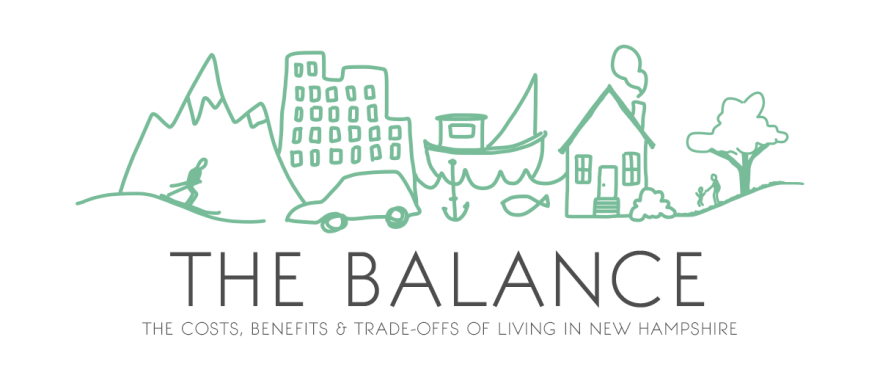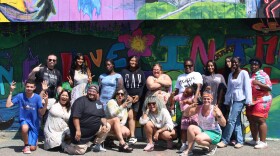At her home studio, embroidery artist Sarah Benning stitches together one of her pieces. It’s a sun-filled room at this time of the morning. The artist’s finished work spills into the space around her with dozens of circular canvases bubbling up onto the walls. There are also plenty of house plants around.
“A lot of my work is inspired by my own house plants,” Benning says, “The very first plant pieces I stitched were actually inspired by houseplants that I killed, luckily I’ve gotten better and they’re not all dead plants now.”
A post shared by Sarah K. Benning (@sarahkbenning) on Apr 6, 2018 at 6:54am PDT
Viewing Benning’s embroidery work feels like looking through little portholes to find scenes of lush green plant life and tiny stitched scenes of home. The artist says she’s inspired by mid-century modern furniture and clean minimal lines.
What started as a hobby for Benning is now a full-time job. She teaches embroidery workshops around the world, consistently sells out of original pieces that range from about $80 to more than $1,000 and has half a million fans keeping up with her work on Instagram.
A post shared by Sarah K. Benning (@sarahkbenning) on Jan 9, 2018 at 9:20am PST
Benning’s lived in Europe and bigger cities like Chicago and Baltimore. But as of this year, her home -- and the hub for her booming art business -- is Keene, New Hampshire.
“The affordability of the area -- for us to have this much space at home -- is really what drew us here,” Benning says.
Virginia Lupi, director of New Hampshire’s State Council on the Arts, says she hears from artists all the time who move here for affordability reasons. And she’s got a term for what they help bring to the state: "creative economy."
“What we’re seeing in the last several years is an increase in the number of towns and cities who are developing arts commissions,” Lupi says. “These are often volunteer, but units of local government that are very interested in promoting the creative economy in their communities.”
This term -- the creative economy -- applies to a broad collection of professionals: folks in the advertising industry and nonprofits. And artists like Benning, too.

But the question is: Why are cities and towns in New Hampshire so enthusiastic about it?
“Quite honestly, the creative economy is very big business in our country and in the state of New Hampshire,” says Nicolette Clarke, executive director of the Capitol Center for the Arts in Concord.
Clarke points to 2015 data compiled by the Bureau of Economic Analysis which shows Arts and Culture is a $2.3 billion industry in New Hampshire. It accounts for about 3 percent of total gross state product.
And focusing on the creative economy has become something of a trend. There’s a bill making its way through the state legislature which would create a council on the creative economy. May’s state tourism conference includes a presentation about prosperity through arts and culture.
But not everyone can get behind the idea. Ben Davis is a national art critic for Artnet.
“There was developed this idea of the creative economy, which is this kind of magical totem you could wave around and in theory it solves all these problems,” Davis says. “In fact it doesn’t really work like that.”
Davis is skeptical of touting the creative economy for several reasons. “It’s such a broadly shared idea that, if everybody’s counting on doing the same thing across the country -- from Santa Fe, New Mexico to Appalachian, West Virginia, not everyone can become the cool creative destination at once,” Davis says.
But there are people who are actively working to make New Hampshire that cool creative destination.
Rebecca Hamilton and partner Danya Landis co-founded a company called Machina Arts, which manages live events and offers design services. They also put on regular concerts at a venue they run in Keene.
“We loved being in the area but we felt it was lacking in the kind of culture that we wanted to be a part of: The creative arts community,” Hamilton says. “And we realized we had a decision that we could either leave the area, move to New York City, San Francisco -- some big city that was a hub for culture -- or we could create the kind of experience we wanted to have.”

Hamilton has roots in the area: Her other job is vice president of Research and Development at Badger, her family’s beauty product company in Gilsum. She finds her two occupations have interests that overlap, especially when it comes to recruiting.
“When we’re looking at bringing in top talent, one of the challenges we have is that it’s really hard to relocate someone to this area,” Hamilton says. “And if there was more of a creative economy here, I think that it would help us to bring and attract talent.”
For Hamilton, the health of New Hampshire’s creative economy is bound up with the broader economy -- and with the future of the state.







